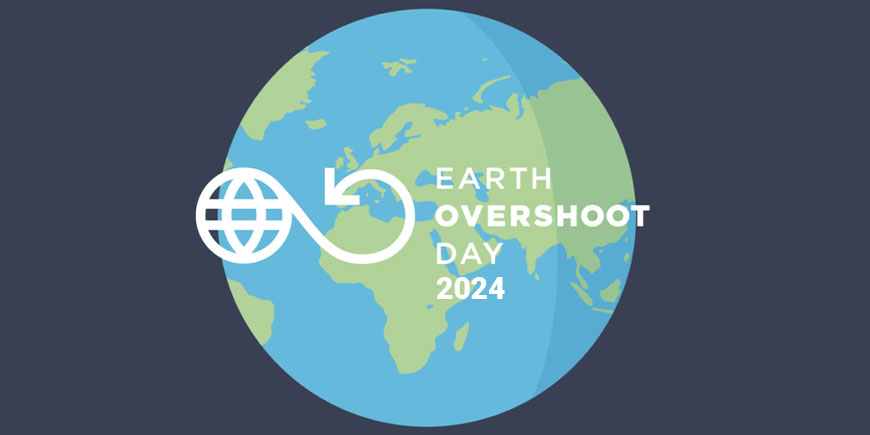Earth Overshoot Day: From today, 1 August, we are in debt to the planet. We consume the equivalent of 1.7 planets every year.
Every year the world touches Earth Overshoot Day (EOD). But there is nothing to celebrate.
Earth Overshoot Day 2024
Today, 1 August 2024, is Earth Overshoot Day 2024. This symbolic day marks the point at which humanity’s demand for ecological resources and services in a given year exceeds what the Earth can regenerate in that year. Calculated annually by the Global Footprint Network, this event highlights how in just 7 months, humanity has consumed all the resources the Earth can produce in 12 months.
Globally, our resource use has reached the equivalent of 1.7 planets per year. If current trends in consumption and resource use continue, it is predicted that by 2030 we will need the equivalent of two planets to support our lifestyles and needs.
How EOD is calculated
The date of Earth Overshoot Day has been calculated since the early 1970s by the Global Footprint Network, an international research organisation that monitors humanity’s ecological footprint.
To calculate this date, two key values are taken into account:
- The planet’s biocapacity: This is the amount of ecological resources the Earth can produce in a year.
- The ecological footprint of humanity: This measures the global demand for resources.
The difference between these values is used to determine the point at which resource consumption exceeds the planet’s ability to regenerate those resources. The resulting figure is then multiplied by 365, the number of days in a year, to identify the specific day on which this overshoot occurs.
This means that by Thursday 1 August 2024, humanity will have “used up” all the resources that nature can produce in an entire year and will begin to operate in deficit. With over 8 billion inhabitants, humanity is consuming resources at a rate that exceeds the planet’s capacity to regenerate and absorb.

Italy in debt since 19 May
As reported in the article “Overshoot day 2024: in Italy it will be the 19th of May“, the situation in Italy remains particularly critical, despite a slight improvement compared to previous years. Our country reached its Overshoot Day on 19 May.
Although the date of Italy’s Overshoot Day has shifted slightly later compared to recent years (15 May in 2023 and 2022, 13 May in 2021 and 14 May in 2020), the situation remains alarming. Italy is in the top half of the global list, indicating a particularly high ecological debt.
If everyone lived according to the standards and consumption levels of Italians, we would need the equivalent of 2.6 Earths to meet collective needs.
This reflects a high level of ecological debt and a high rate of consumption relative to available resources. The situation underlines the urgency of adopting concrete measures to reduce our environmental impact and promote more sustainable development.
Consequences and implications of Earth Overshoot Day
Reaching the limits of available resources and being ‘in debt’ to the planet has real and worrying implications for humanity. With over 8 billion inhabitants, our consumption far exceeds the Earth’s capacity to regenerate and absorb natural resources.
This phenomenon has become increasingly alarming over the years. Fifty years ago, in 1974, Overshoot Day fell on 30 November, marking a budget overrun of just one month. By 2004, the date had moved to 2 September, and by 2014 it was 5 August. The continual advancement of this date demonstrates a growing ecological debt, indicating how we are depleting the planet’s natural resources.
The persistence of this state of overexploitation of nature for more than half a century has led to a drastic loss of biodiversity, with many animal and plant species now extinct or in serious danger of extinction. The excess of anthropogenic greenhouse gases in the atmosphere has contributed to significant climate change. The effects are increasingly evident: heat waves are more frequent and intense, wildfires more destructive, droughts more severe and floods more devastating. These extreme phenomena not only threaten natural ecosystems, but also pose a serious threat to our very survival.
The growing ecological debt points to a systemic crisis that requires urgent and concrete action to reverse the trend. It is essential to adopt measures to reduce resource consumption, limit greenhouse gas emissions and promote sustainable practices that can ensure a habitable future for future generations. Our continued exceeding of available resources is a clear call to action to restore ecological balance and seriously address the climate crisis.
Solutions to slow down EOD
According to WWF, there are many solutions that can be adopted at a community or individual level to have a significant impact on the kind of future we invest in:
- Using 75% of energy from renewable sources (compared to the current 39%) could bring Overshoot Day forward by 26 days.
- Saving and using existing energy efficiency technologies for buildings, industrial processes and electricity generation could add another 21 days.
“If humanity was more or less in balance with nature until the 1960s, the date has moved forward each calendar year until today’s early August. This means that humanity has been in ecological overshoot for more than 50 years. Continuing to live beyond the physical means of our planet is a finite option that risks ecological disaster: the goods and services that form the basis of our societies and economies are all produced by healthy, functioning ecosystems. We now have many targeted solutions to reverse resource depletion and support the regeneration of the biosphere in which we live. Opportunities exist in all sectors of society. Addressing food systems alone could reduce our debt: halving meat consumption would add 17 days to life, and eliminating the food loss and waste that plague the planet would add 13 days to life. It is essential to act now and stop wasting precious time,” says Eva Alessi, Head of Sustainability at WWF Italy.


